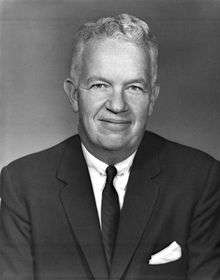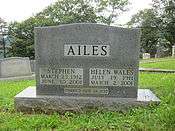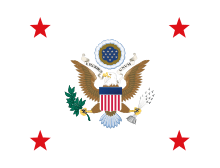Stephen Ailes
Stephen Ailes (March 25, 1912 – June 30, 2001) was a prominent member of the District of Columbia Bar and a partner in the firm of Steptoe & Johnson. He served as the United States Under Secretary of the Army from February 9, 1961 to January 28, 1964[1] and as United States Secretary of the Army from January 28, 1964 to July 1, 1965. He received his undergraduate education at Princeton University, and attended the law school of West Virginia University, where he was a member of Phi Kappa Psi fraternity.
Stephen Ailes | |
|---|---|
 | |
| 8th United States Secretary of the Army | |
| In office January 28, 1964 – July 1, 1965 | |
| President | Lyndon B. Johnson |
| Preceded by | Cyrus Vance |
| Succeeded by | Stanley Rogers Resor |
| Personal details | |
| Born | May 25, 1912 Romney, West Virginia, U.S. |
| Died | June 30, 2001 (aged 89) Bethesda, Maryland, U.S. |
| Resting place | Indian Mound Cemetery |
| Political party | Democratic |
| Spouse(s) | Helen Wales
( m. 1939; |
| Children | 4 |
| Relatives | William B. Cornwell (granduncle) John J. Cornwell (grandfather) Marshall S. Cornwell (granduncle) |
| Education | Princeton University (BA) West Virginia University (LLB) |
Early life and education
Stephen was born in Romney, West Virginia, on May 25, 1912.[1] He attended the Scarborough School in New York with his brother,[2] and later attended Episcopal High School in Alexandria, Virginia and graduated in 1929.[1] He graduated from Princeton University in 1933[1] and received his law degree from West Virginia University in 1936. He was admitted to the West Virginia bar in 1936.[1]
Legal career
He was appointed assistant professor of law at West Virginia University, 1937 – 1940.[1] He was prevented from military service due to color blindness;[3] but later he was hired at the Office of Price Administration in 1942 until 1946.[1] He served as counsel to the American Economic Mission to Greece in 1947, and then returned to private practice at Steptoe & Johnson in 1948; beforce entering government services.
Government career
Ailes served as Under Secretary of the Army, 9 February 1961 until 28 January 1964[1] and he was then promoted to Secretary of the Army until 1 July 1965.[1] He is oft credited as the driving force for the creation[4] of the United States Army Drill Sergeant program. He conducted a far-reaching survey over time that included a wide variety of experienced personnel across all the services and the results contained five principal findings, with appropriate recommendations and suggestions for eliminating the problems encountered. The Training and Doctrine Command's annual Drill Sergeant of the Year award is named after Ailes.[5]
Ailes came under heavy criticism by both Democrats and Republicans in early 1965 when he sought funding from a U.S. Senate appropriations subcommittee for what was quickly derided as the "Instant Veteran Program". As critics summarized the Ailes proposal, up to "8,000 young men incapable of meeting the minimum physical and mental requirements for military service" would be still be inducted into the U.S. and "could serve one day and then be discharged as a veteran, eligible for veterans' benefits available to service men who had completed long periods in uniform." [6] Ailes testified that the plan (which the subcommittee declined to endorse) would cost $31,300,000 in its first year in 1965 dollars, the equivalent of $235 million fifty years later.[7]
From 1965 to 1970, Ailes was head of the Federal City Council, a group of business, civic, education, and other leaders interested in economic development in Washington, D.C.[8]
Personal life
Stephen married Helen 'Nellie' Wales on June 24, 1939.[9] and had four children. He died on June 30, 2001 from a stroke at his home in Bethesda, Maryland.[9] He is buried in his home town of Romney at Indian Mound Cemetery.

References
- Bell, William Gardner (1992). ""Stephen Ailes"". Secretaries of War and Secretaries of the Army: Portraits and Biographical Sketches. United States Army Center of Military History. Retrieved September 22, 2007.
- "Stephen Ailes ('36 JD)". West Virginia University Alumni Association. Archived from the original on September 17, 2011. Retrieved November 17, 2014.
- Barnes, Bart (July 8, 2001). "Stephen Ailes; Army Secretary in '60s". Los Angeles Times. Retrieved August 25, 2011.
- "History of the Drill Sergeant". United States Army. Retrieved September 2, 2012.
- "Stephen Ailes Award". Association of the United States Army. Archived from the original on October 18, 2006. Retrieved September 2, 2012.
- "Rap 'Instant Veteran' Plan— Senators Ask How Day Can Equal Years— Hit Ailes Idea as Social Scheme", Chicago Tribune, February 16, 1965, p1
- CPI Inflation Calculator, Bureau of Labor Statistics
- Barnes, Bart (July 6, 2001). "Stephen Ailes Dies". The Washington Post. p. B6; "Federal City Council Elected". The Washington Post. September 30, 1970. p. D9.
- "Stephen Ailes '33". Princeton Alumni Weekly. October 24, 2001. Archived from the original on October 5, 2012. Retrieved August 25, 2011.
External links
![]()
| Government offices | ||
|---|---|---|
| Preceded by Hugh M. Milton II |
United States Under Secretary of the Army February 1961 – January 1964 |
Succeeded by Paul Robert Ignatius |
| Preceded by Cyrus Roberts Vance |
United States Secretary of the Army January 1964 – July 1965 |
Succeeded by Stanley R. Resor |

